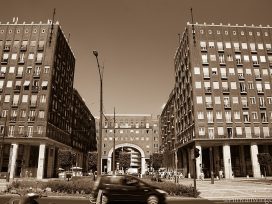The spectre of illiberalism is haunting Western Europe. Traditional parties seem unable to respond to the real (and invented) problems that Europe is now facing. What is more, illiberalism in recent years has grown and become more widely accepted in some Central European countries. The Hungarian prime minister, for instance, infamously boasted that his country is an ‘illiberal democracy’. And surely, after some prodding and flattery, Jarosław Kaczyński, the éminence grise of Polish politics, would probably agree that such a description would apply to the status quo in Poland today. In the past, the term was reserved as stark criticism for modern autocratic regimes with partially-free elections, but now it is being used to designate a legitimate alternative to liberal democracy. How and why has this unexpected development taken place?
Blame the bureaucrats
Perhaps the most significant factor in all of this is that the European Union has gradually plunged into political crisis. The first crisis began in 2004, just after its great expansion. It was followed by the 2008 economic crisis and accelerated, as a result of the massive influx of refugees from Syria and elsewhere and the Brexit vote last summer. What a decade ago was perceived as a disturbing and marginal phenomenon is gradually haunting Europe in the form of authoritarian politics and a defiance of a cornerstone of liberal democracy – the rule of law. The question remains, though, whether the states of Central and Eastern Europe – some of which have already shifted towards the far right – will eventually embrace western liberalism (the core ideology of the EU), or whether populist and nationalist politics will become more widespread.
It seems that the two trends feed off each other. Far-right movements re-emerged in Central and Eastern Europe immediately after the fall of communism; they reconnected with pre-war and Second World War forerunners, but gradually added the modern characteristics of their counterparts in Western Europe. Besides all the ultra-nationalistic and ethnic xenophobic elements, far-right politics now also included criticism of socially progressive causes – such as gay rights and women’s rights – and of the EU for being their main promoter. Despite the huge political, social and economic benefits stemming from EU membership, as well as the widespread public support, the far right has somehow successfully managed to dump all the blame on imaginary bureaucrats in Brussels, who promote gay marriage, impose refugee quotas on member states and, in the most conspiratorial fashion, try to deprive Central European states of their sovereignty. Needless to say, populists have always used crude stereotypes and sweeping statements in their rhetoric. Paradoxically, even if they deal with problems that are real, they seldom solve them or even wish to, for they only seek political gain.
It is still unclear whether Central Europe could initiate yet another global or European political crisis, or whether this is just a temporary anomaly in the region. What is certain, however, is that we are witnessing not a Manichean struggle of good and evil, but a struggle between traditional and modern values. In fact, what we see today is a twenty-first century rendition of the struggle between liberal democracy and its enemies. Indeed, a recurring tension has emerged that has defined and shaped Europe since the nineteenth century – between enlightenment and reactionary, counter-enlightenment forces. The former fosters liberal values such as individual freedom, protection and universal human rights, while the latter conveys conservative values, such as community, religion, tradition and in some cases ethnic unity and superiority.
Liberal democracy and its discontents
Thus, rather than review the nature of illiberalism in Central Europe, let us look at the basic precepts of liberal democracy and its multiple rivals in the past. This will allow us to bring some context to current developments in the region.
The status and merit of liberal democracy is, of course, a hotly debated topic. Moreover, it is often misconstrued, and deliberately so. Its critics usually pair it with liberalism, which is considered to be a hyper-tolerant and relativistic ideology, responsible for all the social problems of the modern era. In the former communist states, a large section of the elite blames liberal democracy for all the ills of the post-communist transformation: that it opened the doors to corruption, cynicism, greed and mass privatisation. Others argue that it has weakened the state and its public institutions, thus allowing crass politicians and economic oligarchs to exploit the state and to siphon off funds that could have been used to support social welfare and education.
The critics of liberal democracy span from the right and left of the political spectrum. These intellectuals and ideologues – sometimes in the same person – often see liberal democratic political structures and the ideology of liberalism as one and the same insidious conspiracy, which is brainwashing pious folk, the toiling masses and confused intellectuals. From the right, liberal democracy is denigrated for undermining moral values, religious beliefs and the spirit of patriotism. Some rightwing ideologues blame liberals for weakening the state’s centralising power, while others maintain that liberal democratic states are too strong and intrusive. The religious right often views liberals as outright immoral for allowing abortion and favouring same sex marriage.
Liberal democracy is dismissed by some on the political left as a cynical cover-up for prevailing and growing economic disparity. It is seen as an imperialist system that only pretends to care about individual freedom and wellbeing. In addition, some on the left view liberal democratic states as weak because they are unable to confront large corporations that are largely responsible for greenhouse gas emissions and exploiting workers in developing countries. These, it is claimed, lack the energy to confront their poverty, crime and demographic explosion, leaving them exposed to religious and ideological extremism. Indeed, one can find many intellectual writings that indirectly and sometimes directly blame liberal democracy for the rise of religious extremism in the Muslim world. Liberal democracy is said to be in its post-imperialist phase – selfish, self-contained, providing only alms to third world countries created by and still not recovering from the imperialist past.
It is a paradox to witness so much criticism of liberal democracy today, considering that its structure is so widespread. Nearly every country in the world uses the separation of powers model, where the state is divided into three different branches of power – legislative, executive and judiciary – and holds general and periodic elections. The constitution in most countries guarantees the independence of the three branches of power and thus legitimises the authority of those powers. However, the written constitution and political reality differs from country to country and often legislative and judiciary powers are subservient to a powerful executive. The existence of the three branches provides legitimacy to the state but it does not guarantee the spirit of liberal democracy. Indeed, good constitutions are a precondition but not a guarantee of a fair distribution of power, where no one branch dominates over the other two. A liberal democratic form of government is the culmination of liberalism, both in the structure and in the manifestation of its core practices, norms and values.
What does liberal democracy stand for?
As an ideology, liberalism went through a major transformation and its various strands have helped shape the political spectrum of many present-day liberal democracies. The reason for its evolution is due to the constant adjustments made when political environments change. By their very nature, liberal democracies are always in a competitive mode and are used to confronting enemies and rivals. As Ernest Gellner remarked with some satisfaction, twentieth–century liberal democracies defeated their enemies with their enemies’ own weapons – fascism militarily and communism economically.
There are some basic tenets of modern liberalism that distinguish it from other ideologies: the state must secure justice and freedom for its citizens and it must guarantee constitutional democratic governance, free elections and the division of powers, including the independence of the judiciary. It must be a guarantor of individual freedom both from external interference (negative freedom) and of the right of citizens to participate in the political process (positive freedom). The democratically-elected majority must respect the political opposition and grant equal rights to members of minority groups. The state must provide personal security for individuals and at the same time contain the power of the police. Finally, the state must foster a free market. Only after all these conditions are met can one can truly speak about liberal democracy – one that is not only democratic but also fulfils the norms of a just and free society. These norms and values can survive only if a society is affluent enough to provide not only material security but also the feeling of security that oneself and one’s family will not starve tomorrow.
Part of the confusion is that, in the early nineteenth century, liberals dwelled on the Lockean conception that favours protection of private property and individual liberty and on Adam Smith’s preference for a weak state in order to foster laissez faire capitalism. Curiously, these principles are also held by many present-day conservatives. The late liberals, whose views are poignantly expressed in the writings of T.G. Green and John Dewey, realised that free markets must be regulated and progressive taxes introduced by governments in order to protect the welfare of their citizens. As a result the role of the state increased during the twentieth century and the task was, once again, to achieve checks and balances among the executive, legislative and judiciary powers. Late liberals were also responding to pressures coming from the Marxist left; they were offering social welfare benefits while at the same time protecting private property and trying to regulate (rather than subdue) the free market. Following the Second World War, the mainstream political parties in most Western European countries (both on the right and left) differed only slightly in their support for the welfare state.
Further confusion is added when critics invariably confuse liberalism with libertarianism (whose main enemy is the state) and neoliberalism (that reduces politics to economics). Although related to liberalism in many ways, libertarianism is a narrow ideological obsession with weakening and restricting the function of the state. Neoliberals, on the other hand, are wary of any ideology and in favour of political ‘pragmatism’; the main task of politicians and state institutions, according to neoliberals, is to allow the free market to take care of all the needs and ills of society. A prosperous economy, according to Friedrich Hayek and Milton Friedman, is sufficient not only for the material wellbeing of society but also for fostering justice and freedom. Most of those who call themselves liberals in Central Europe see themselves – and are perceived by others – as neoliberals rather than modern liberal democrats.
The great enemy of liberalism
It is against this background that we have to judge the recent developments in Central and Eastern Europe. Although the illiberal tendencies of Central European nationalists have been present at least since the fall of communism, the refugee crisis has mobilised the far right and shown that radical groups are more numerous here than in Western Europe. And indeed, liberal democracies have no sound strategy with which to deal with the refugee crisis. The only excuse for keeping the refugees out is security and the preservation of current standards of living.
‘The fear that there will be not enough to go around,’ as Richard Rorty argued decades ago, is the great enemy of liberalism and ultimately of liberal democracies. The resulting feeling of insecurity, he continued, ‘makes people claw back what there is, for use by people “like us”’. This real and psychological threat prevents us from sharing with others, especially when we feel we might lose everything. In Central Europe, where poverty is a vivid memory as well as the strong sense that what is present today may disappear tomorrow, this response is particularly prevalent.
In Central and Eastern Europe, a myriad of nationalists, chauvinist, racists, religious fanatics and populists are able to exploit fear and insecurity for their own political gains. The – often corrupt – established parties are divided, mute and aloof to the concerns of the people. At present, there seems to be no viable political alternative that is promoting liberal democratic values. However, there is no reason to believe that this will be the norm in the future. In the past we have witnessed a variety of illiberal politicians being defeated.
Indeed, despite the current crisis in the EU and the rise of illiberal democracies in Central Europe, liberal democracy seems to be the only political system that has the power and capacity to overcome the obstacles that could endanger its own existence. In the past, it proved to be flexible, powerful and successful against external ideological enemies. Besides, if civil society was able to operate during an oppressive communist period, then it can consolidate in the future too. As anti-liberals of the past will confirm, populists and nationalists can win elections but always fail to deliver while in government. They cannot fulfil what they promise (since it is largely unrealistic), nor can they run sound fiscal policies and a functional, sustainable government.
Despite recent political setbacks in Hungary and Poland, and the unstable and uncertain situation in Slovakia, Romania and even the Czech Republic, there is no reason to despair. Liberal democracies are more resilient than they appear at the present moment. A majority of the population in this region prefers what liberal democracy has to offer: individual rights, prosperity, and freedom of travel.. Indeed, if these countries had reasonable alternatives – politicians who supported individual rights, upheld the rule of law and fought corruption and nepotism – then many more people would vote for candidates who genuinely supported liberal democratic values. Hopefully, those politicians will re-emerge soon and offer voters viable political alternatives. It is only then that we can imagine the emergence of some kind of political progress.
Conversely, if liberal democracies are not able to handle future threats, no other political system will be capable of doing so either. Let us not underestimate the majority of citizens in the region. The people who elected Iveta Radičová, Ferenc Gyurcsany, Aleksander Kwaśniewski, Donald Tusk, Klaus Iohannis or Bohuslav Sobotka could elect their kindred spirits in the future. It might take a few more years (perhaps another electoral period), but sooner or later the majority of Central Europeans will find out for themselves what kind of government benefits them the most. For them, the motto of Abraham Lincoln also holds that people cannot be fooled all the time.
This article was supported by APVV agency grant no. APVV-15- 0682






